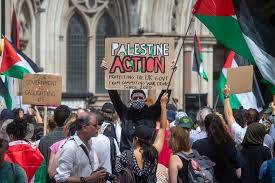By Dominic Casciani, Home and Legal Correspondent (@BBCDomC)
The High Court has ruled that Palestine Action may challenge its controversial proscription under the UK’s terrorism laws, a move hailed as a major legal development.
Demonstrators gathered outside a pre-trial hearing on 30 June in support of those accused of protesting at an Elbit Systems UK factory. Many held banners reading, "Palestine Action: Heroism Not Terrorism."
The group, known for direct actions targeting UK defence companies linked to Israel, was banned last month by Home Secretary Yvette Cooper, who cited an incident at RAF Brize Norton where followers allegedly caused £7 million in damage to military aircraft.
Under the proscription, supporting or being a member of Palestine Action is a criminal offence, punishable by up to 14 years in prison.
However, Mr Justice Chamberlain ruled that the ban must be reviewed, warning that without prompt High Court intervention, prosecutions could lead to “chaos,” with conflicting verdicts across courts.
> "If the legality of the proscription order can properly be raised by way of defence... that would be a recipe for chaos," the judge noted, calling for a judicial review due to its impact on freedom of speech and protest.
Lawyers for co-founder Huda Ammori argue the ban violates civil liberties and amounts to silencing legitimate dissent. After the ruling, they requested a temporary suspension of the ban pending review.
Meanwhile, opponents of the ban are planning a demonstration in London next month.
Cross-Government Debate Over the Ban
BBC-obtained documents show ministers debated for eight months before deciding to proscribe the group. Although UK terrorism laws permit bans for organisations that incite serious violence or cause major property damage, critics argue this move overreaches.
Palestine Action became the first group banned under the “serious criminal damage” provision of the law.
Since its 2020 launch, the group has carried out over 385 direct actions and has led to more than 676 arrests. The debate intensified following a break-in at Elbit Systems in Bristol, which allegedly involved assaults on security personnel.
Police chiefs warned existing legislation was inadequate, and that the group remained “unaffected” by ordinary criminal investigations.
> “There is currently no existing legislation to deal with \[Palestine Action] holistically,” a March Home Office report noted, adding that piecemeal prosecutions were proving ineffective.
While police supported the ban to prevent further action, they also cautioned it might appear as "state repression".
Concerns Over Freedom and Bias
The Foreign, Commonwealth and Development Office (FCDO) also expressed concerns. Though some partners might view the ban as a stance against antisemitism, others, particularly in the Arab world, could see it as an attack on activism.
A Home Office analysis noted the risk of inflaming tensions within the UK:
> “Proscribing PA would almost certainly be perceived as evidence of bias against the British Muslim community,” internal documents warned.
By late March, the Home Secretary was close to a decision and moved forward with the ban following the 20 June RAF incident.
Broader Impact on Free Expression
Justice Chamberlain said a full ruling may not come until 2026, a delay that could suppress public debate on Palestinian rights. He cited multiple examples of a growing “chilling effect,” including:
A Kent woman questioned by armed police for displaying a “Free Gaza” sign.
Peter Tatchell, a human rights campaigner, stopped at a public concert for wearing a Palestinian flag badge.
> “Such reports are liable to have a chilling effect on those wishing to express legitimate political views,” the judge concluded.




No comments yet
Be the first to share your thoughts!